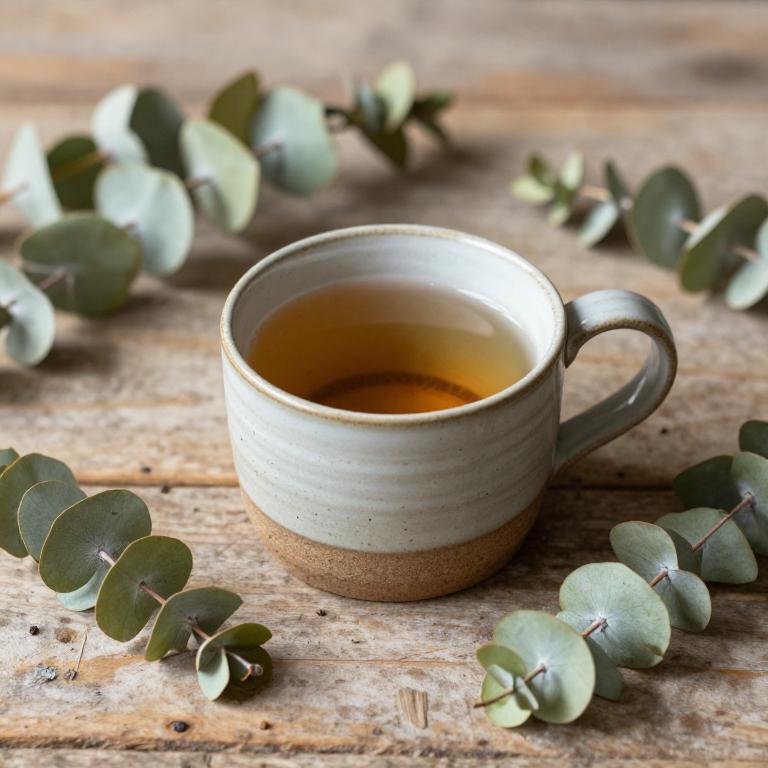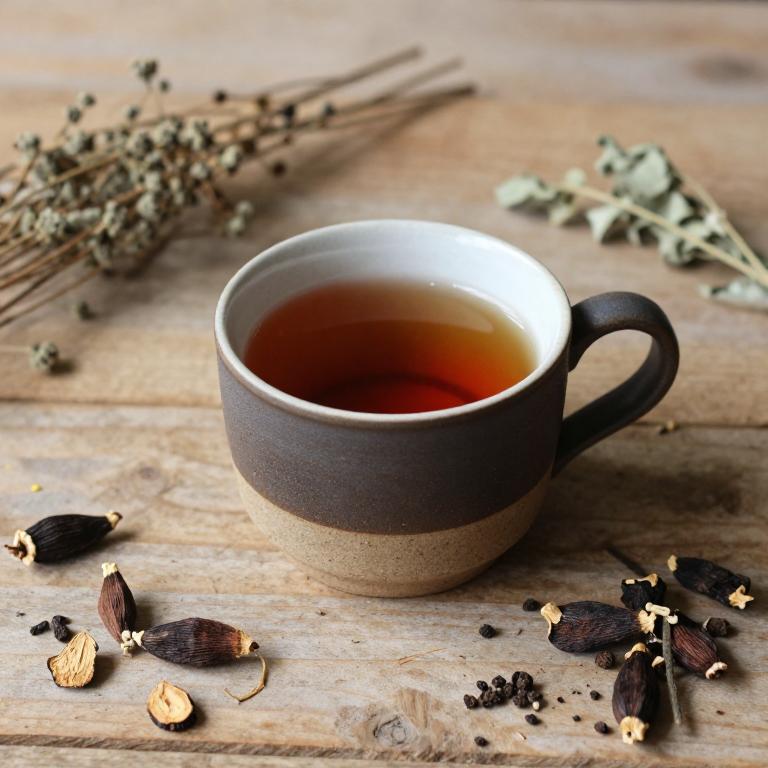10 Best Herbal Teas For Nasal Congestion

Herbal teas can be a natural and soothing remedy for nasal congestion, offering relief without the side effects of over-the-counter medications.
Popular choices include eucalyptus, peppermint, ginger, and chamomile, each known for their decongestant and anti-inflammatory properties. These teas work by helping to loosen mucus, reduce inflammation in the nasal passages, and promote easier breathing. To use them effectively, it's best to drink warm herbal tea several times a day, especially when symptoms are most severe.
While herbal teas are generally safe, it's important to consult a healthcare provider if symptoms persist or worsen, as they may indicate a more serious underlying condition.
Table of Contents
- 1. Eucalyptus (Eucalyptus globulus)
- 2. Camellia (Camellia sinensis)
- 3. Thyme (Thymus vulgaris)
- 4. Peppermint (Mentha piperita)
- 5. Ginger (Zingiber officinale)
- 6. Rosemary (Rosmarinus officinalis)
- 7. Black pepper (Piper nigrum)
- 8. Stinging nettle (Urtica dioica)
- 9. Salvia (Salvia officinalis)
- 10. Licorice (Glycyrrhiza glabra)
1. Eucalyptus (Eucalyptus globulus)

Eucalyptus globulus, commonly known as the Tasmanian eucalyptus, is widely used in herbal teas to help alleviate nasal congestion due to its potent decongestant properties.
The essential oils in eucalyptus globulus, particularly cineole, have antimicrobial and anti-inflammatory effects that can reduce mucus buildup and soothe irritated nasal passages. When brewed into a herbal tea, it can provide a calming aroma that helps open up airways and ease breathing. This natural remedy is often recommended for individuals suffering from colds, sinusitis, or allergies, as it supports respiratory health without the side effects of over-the-counter medications.
However, it is important to consult with a healthcare provider before use, especially for those with asthma or known allergies to eucalyptus.
2. Camellia (Camellia sinensis)

Camellia sinensis, the plant from which green and black teas are derived, contains compounds that may help alleviate nasal congestion.
The anti-inflammatory and decongestant properties of its polyphenols, such as catechins, can reduce swelling in the nasal passages. Drinking herbal teas made from Camellia sinensis may help loosen mucus and improve breathing in individuals with mild congestion. However, it is important to note that these teas are not a substitute for medical treatment in severe or persistent cases.
While some people find relief from drinking Camellia sinensis-based teas, individual responses may vary, and consulting a healthcare professional is recommended.
3. Thyme (Thymus vulgaris)

Thymus vulgaris, commonly known as thyme, is a popular herb used in herbal teas to alleviate symptoms of nasal congestion.
The essential oils in thyme, particularly thymol, possess strong antimicrobial and anti-inflammatory properties that can help reduce mucus production and soothe irritated nasal passages. When brewed into a tea, thyme can act as a natural decongestant by promoting drainage and clearing the airways. It is often combined with other herbs like eucalyptus or ginger to enhance its effectiveness.
However, it is important to consult with a healthcare professional before using thyme tea, especially for individuals with allergies or existing medical conditions.
4. Peppermint (Mentha piperita)

Mentha piperita, commonly known as peppermint, is often used in herbal teas to alleviate symptoms of nasal congestion.
The essential oils in peppermint, particularly menthol, have a cooling effect that can help open up the airways and reduce inflammation in the nasal passages. Peppermint tea is typically prepared by steeping fresh or dried leaves in hot water, and it can be enjoyed both hot and cold. It is often combined with other herbs like eucalyptus or ginger to enhance its decongestant properties.
While generally safe for most people, individuals with asthma or gastrointestinal issues should use peppermint tea with caution.
5. Ginger (Zingiber officinale)

Zingiber officinale, commonly known as ginger, is widely used in herbal teas to alleviate nasal congestion due to its anti-inflammatory and decongestant properties.
The active compounds in ginger, such as gingerol and shogaol, help reduce mucus production and ease breathing by soothing irritated nasal passages. Brewing fresh ginger in hot water creates a warming tea that can help clear sinuses and relieve symptoms of the common cold or allergies. Many people find that drinking ginger tea regularly can provide long-term relief from chronic nasal congestion.
However, it is advisable to consult a healthcare professional before using ginger tea, especially for individuals with existing health conditions or those taking medications.
6. Rosemary (Rosmarinus officinalis)

Rosmarinus officinalis, commonly known as rosemary, is a fragrant herb widely used in herbal teas to alleviate nasal congestion.
The essential oils in rosemary, particularly camphor and cineole, possess decongestant properties that help reduce inflammation and open up the airways. When brewed into a tea, rosemary can soothe the nasal passages and provide a refreshing, invigorating effect. It is often combined with other herbs like eucalyptus or thyme to enhance its effectiveness.
However, it is important to consult a healthcare provider before using rosemary tea, especially for individuals with asthma or hypertension, as it may have potential side effects.
7. Black pepper (Piper nigrum)

Piper nigrum, commonly known as black pepper, is often used in herbal teas to help alleviate nasal congestion due to its warming and stimulating properties.
The active compound in black pepper, piperine, may help improve mucus flow and reduce inflammation in the nasal passages. When brewed into a tea, black pepper can act as a natural decongestant by promoting circulation and clearing respiratory pathways. It is typically combined with other herbs like ginger or eucalyptus to enhance its effects.
While generally safe, individuals with sensitive stomachs or certain medical conditions should consult a healthcare provider before using black pepper tea regularly.
8. Stinging nettle (Urtica dioica)

Urtica dioica, commonly known as stinging nettle, has been traditionally used in herbal teas to alleviate symptoms of nasal congestion.
The plant contains bioactive compounds such as flavonoids and minerals that may help reduce inflammation and support respiratory health. When brewed into a tea, stinging nettle can act as a natural decongestant by promoting mucus drainage and clearing nasal passages. It is often combined with other herbs like eucalyptus or ginger to enhance its effectiveness.
However, it is important to consult a healthcare professional before using stinging nettle tea, especially for individuals with allergies or chronic respiratory conditions.
9. Salvia (Salvia officinalis)

Salvia officinalis, commonly known as sage, has been traditionally used in herbal teas to help alleviate symptoms of nasal congestion.
The plant contains compounds such as thujone and flavonoids, which may possess anti-inflammatory and decongestant properties. When brewed into a tea, sage can help reduce mucus production and soothe irritated nasal passages. It is often recommended as a natural alternative to over-the-counter decongestants, though it should be used with caution and under the guidance of a healthcare professional.
Regular consumption of sage tea may provide relief from mild to moderate nasal congestion, though its effectiveness can vary among individuals.
10. Licorice (Glycyrrhiza glabra)

Glycyrrhiza glabra, commonly known as licorice root, has been traditionally used in herbal medicine for its potential to alleviate nasal congestion.
The herb contains compounds like glycyrrhizin and flavonoids, which may help reduce inflammation and soothe the respiratory tract. When brewed into a tea, licorice root can act as a natural expectorant, helping to loosen mucus and ease breathing. Its soothing properties may also help relieve irritation in the nasal passages, making it a popular remedy for colds and allergies.
However, it should be used with caution, as excessive consumption may lead to side effects such as increased blood pressure.